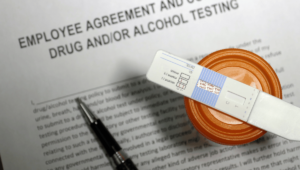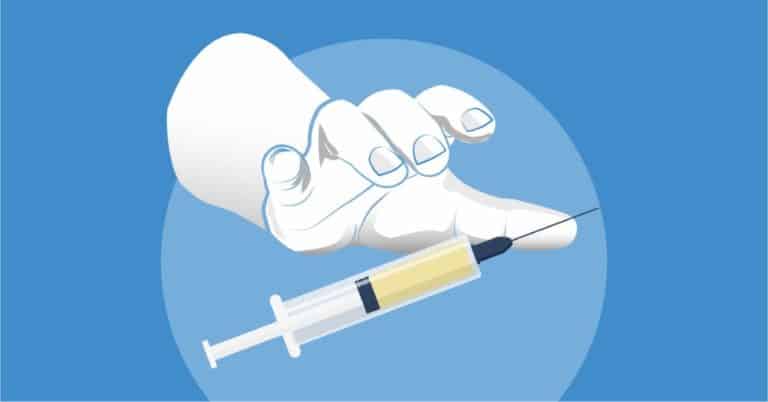Heroin is a dangerous and highly addictive synthetic opioid drug that is made from morphine. It is sold in powder form and as a less expensive, sticky black substance known as black tar heroin. Heroin is usually injected, but it can also be smoked or snorted, resulting in a fast-acting, powerful high. Some people combine heroin with cocaine, which is also known as speedballing. Heroin binds to opioid receptors in the brain which results in a dopamine release, giving the user temporary relief from chronic pain and anxiety. The intense feelings of pleasure combined with the almost immediate high heroin produces makes it a highly addictive drug that can lead to physical or psychological dependence after just one use.
Jump To Section
Human Body Processing Heroin:
Heroin enters the bloodstream within seconds and is then processed by the liver, where it is broken down into morphine, the active ingredient in heroin. The heroin is also broken down into metabolites morphine-3-glucuronide and morphine-6-glucuronide, which are eventually released through urination. Prolonged or intense heroin use can cause liver damage, which can in turn lead to a build-up of heroin in the system as it becomes harder for the liver to process it efficiently. A build-up of heroin can increase your risk of overdose and lead to other health complications.
How Long Is Heroin In Your System?
Your weight, age, metabolism, usage frequency, and intensity all play a role in how long heroin will last in your system. Heroin has a relatively short half-life of 30 minutes, which is how long it takes for most people to process half of the amount of heroin they’ve taken. Traces of heroin and its metabolites can be detected in your system by testing your blood, saliva, hair, or urine, and each test has a different detection window.
Heroin Blood Test
Blood tests can detect heroin in a person’s bloodstream for 5-6 hours after use, though some tests can detect it for up to 48 hours. Blood tests require a lab and are very difficult to cheat.
Heroin Saliva Test
Saliva tests for heroin are portable and can be used to test on the spot for heroin use. The detection window for saliva tests is typically 5-6 hours.
Heroin Hair Test
Hair tests must be processed in a lab and can detect heroin use for up to 90 days after the last dose, and are useful for establishing a pattern of drug use.
Heroin Urine Test
Urine tests are the most commonly administered drug tests for heroin use and can detect heroin for up to 2-7 days after use. Urine tests are used in workplaces, rehab facilities, and in legal proceedings, as they are portable and difficult to cheat. Urine tests are designed to detect heroin metabolites, which stay in a person’s system longer than the actual drug itself.
Getting Heroin Out Of Your System
There is no way to get a dose of heroin out of your system faster than your liver and kidneys are able to process it. Heroin is a very dehydrating drug, so drinking plenty of electrolyte beverages and water can help flush it out of your system and support your body’s natural detox process. Keep in mind that your liver can only process a limited amount of heroin at a time and that the heroin metabolites will still be present in bodily fluids long after the effects of the drug have worn off.
Can You Beat A Drug Test?
There are many websites that claim that they can help you beat a drug test, but the methods they recommend are unreliable at best. The only way to pass a drug test is to be tested outside of the given detection window or to just not take the drug in the first place. If you are going to be drug tested for a serious reason such as obtaining housing or for legal proceedings, it’s best to stay sober.
Detoxing From Heroin:
Detoxing from any opioid, including heroin, is potentially dangerous and should be done in a safe environment with professional medical supervision. Some people require medication-assisted treatment to help them slowly taper off of heroin and regulate thier withdrawal symptoms. No matter the case, everyone can benefit from therapeutic support to help them manage the detox process and keep them focused on their recovery goals. In order to detox from heroin, you must taper off the drug until you are no longer physically reliant on it and are able to carry on with your normal activities.
Heroin Withdrawal:
Heroin withdrawal tends to be a difficult and uncomfortable process that can begin within a few hours of a person’s last dose and peak within 2-3 days. Short-term withdrawal symptoms include sweating, insomnia, bone pain, nausea, and high blood pressure. Long-term withdrawal symptoms include depression, fatigue, memory loss, a marked lack of focus, and drug cravings. The severity and length of these withdrawal symptoms vary depending on the individual’s history of drug use, and thier overall physical and mental health.
Reach Out To Ethan Crossing For Addiction Treatment
If you or someone you love is struggling with Heroin addiction, it’s important to seek help as soon as possible. Addiction is a serious condition that can have harmful effects on your health, relationships, and overall well-being. Treatment can help you break free from the grip of addiction and begin the journey to recovery. Don’t wait any longer to take control of your life. Reach out to Ethan Crossing Addiction Treatment center today and start the path to a healthier, happier future.
Frequently Asked Questions
-
How long does heroin stay in your body?
About 2-7 days after your last dose, but it can be detected in your hair for up to 90 days.
-
Can drinking water help you get sober faster?
No, but it will help flush the heroin out of your body and keep you hydrated.
-
Can you beat a drug test for heroin?
No. There is no foolproof way to beat a heroin drug test unless you haven’t been using heroin.
-
Does heroin cause liver damage?
Yes, it can.














